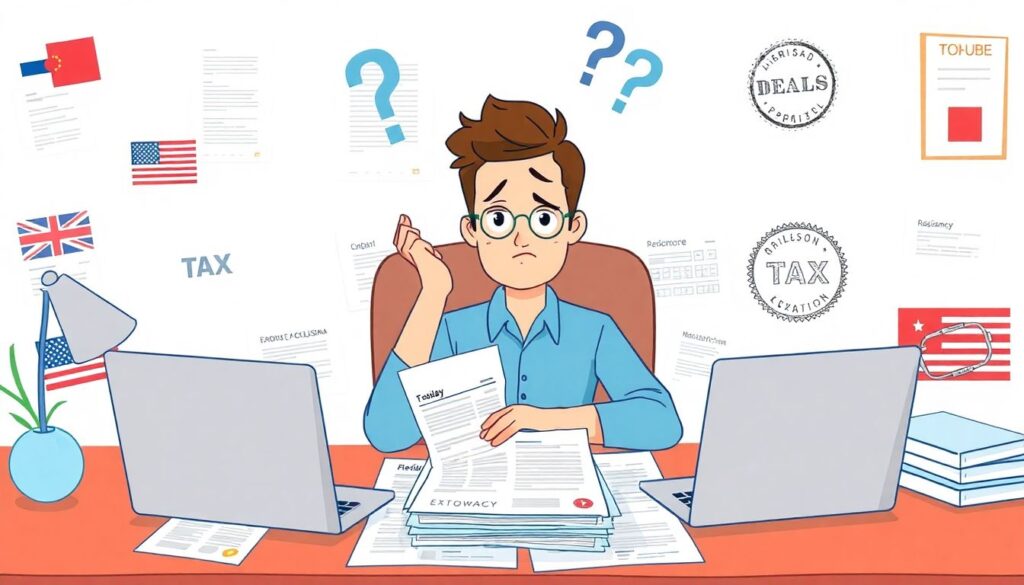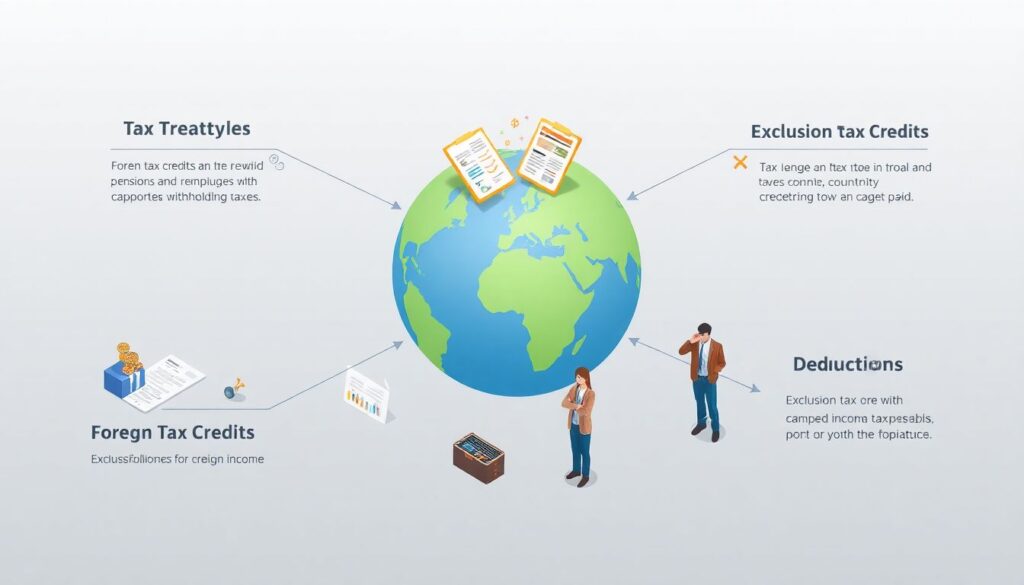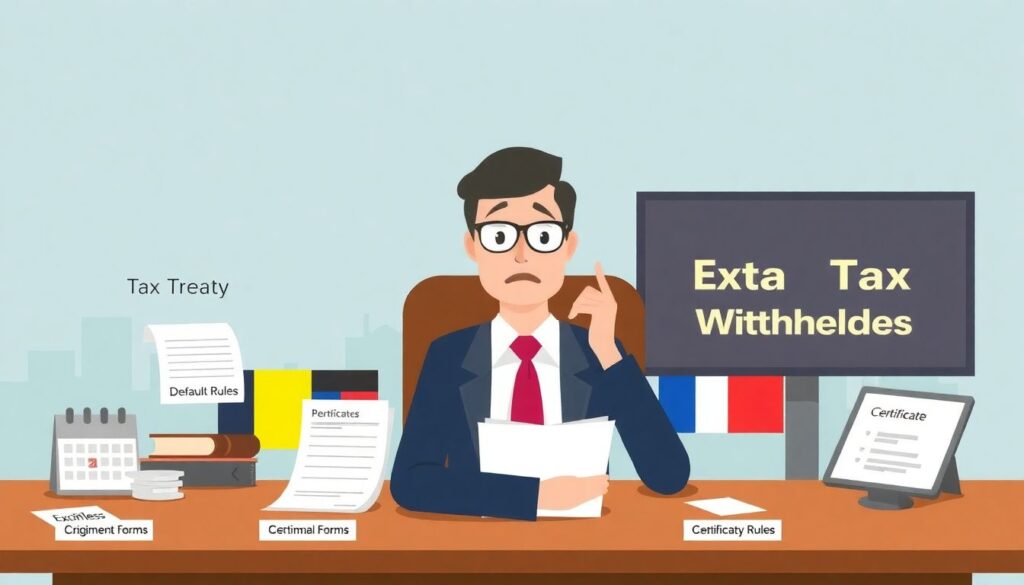Why expat taxes feel confusing (and what this guide will do)

Living abroad is exciting until tax season shows up with forms from two different countries, mysterious words like “residency” and “foreign earned income exclusion,” and horror stories about double taxation. This guide walks you through the fundamentals of international taxation for expats in a clear, step‑by‑step way. We’ll look at what actually matters, where people most often mess up, and how different approaches work in practice: doing it yourself, using expat tax filing services online, or deciding to hire international tax advisor for expats. By the end, you should understand the big picture well enough to ask the right questions, avoid common traps, and choose a strategy that fits your situation rather than hoping it will all “somehow” sort itself out later.
If you remember only one thing, let it be this: both your old country and your new one may want to tax the same income, but there are structured tools to prevent that—if you know how to use them.
Step 1. Figure out who can tax you: residency vs. citizenship
Most countries tax based on where you live (residency), while a few, like the US, tax based on citizenship. That difference is the root of many expat headaches. Your first task is identifying which countries can legally claim you as a taxpayer right now. Each country has its own residency tests: days spent there, where your “center of life” is, where your home and family are, or where you habitually work. For US citizens abroad, there’s an extra twist: you’re generally taxed on worldwide income no matter where you move, so expat tax services for US citizens abroad must account not only for where you reside but also for these citizenship-based rules, which can still apply long after you’ve emotionally left your home country.
Don’t rely on “I’m registered at a foreign address, so I’m fine.” Tax authorities care about facts, not mailing labels.
Warning for beginners: the 183-day myth
A lot of new expats believe that as long as they stay under 183 days in any one country, they’re safe from taxes there. That’s dangerously incomplete. Some countries can treat you as tax resident with fewer days if your main home, spouse, or job are there. Others may tax certain types of income (like rental property or local employment) even if you never meet residency thresholds. Always read the actual residency rules for each country you touch, or get international tax advice for expats before assuming that your travel calendar alone protects you.
If a rule “everyone knows” sounds too neat, double-check it.
Step 2. Map your income: what’s taxed where?
Once you know who can tax you, list all your income streams: salary, freelancing, consulting, dividends, interest, crypto, stock options, rental income, pensions, and any side hustles. Then ask, for each: in which country is this income sourced, and in which country am I taxed as resident? Many expats discover that the same income shows up in both buckets. That’s where tax treaties, foreign tax credits, and exemptions come in; they are meant to stop double taxation, but only if you claim them properly. Missing one form can mean paying twice. A structured overview—literally a written list of income types and countries—turns a scary fog into a solvable puzzle instead of a mess of surprise tax bills.
If you don’t write it down, you’ll almost certainly forget something under pressure.
Different approaches: DIY spreadsheet vs. professional mapping
You can sketch this income map yourself in a spreadsheet, which is fine if your situation is simple: one job, one country of residence, one home country with no rental properties or business ties. But once you add stock options, foreign companies, or multiple moves in a single year, a pro will usually see issues you never knew existed. The best tax accountant for expats near me is unlikely to guess your full situation from memory alone; they’ll appreciate a clean list that you’ve already prepared. DIY mapping saves money and helps you understand your own finances, but having a professional validate your map can prevent mistakes that cost far more than their fee.
Use DIY for clarity, not as an excuse to avoid expert review when things get complex.
Step 3. Learn the trio that prevents double taxation

International taxation for expats largely revolves around three tools: tax treaties, foreign tax credits, and exclusions/deductions for foreign income. Tax treaties are agreements between countries that decide who gets to tax what and sometimes cap withholding taxes on dividends or pensions. Foreign tax credits allow one country to give you credit for tax already paid in another, so you don’t pay twice on the same income. Exclusions and special deductions, like the US foreign earned income exclusion, can remove part of your foreign salary from your home-country tax base if you meet strict conditions. Misunderstanding any part of this trio can lead to either overpaying, or worse, underpaying and facing penalties years later.
Reading a treaty is boring, but ignoring it is expensive.
Common mistake: assuming treaties help automatically

Many expats think, “My countries have a tax treaty, so I’m protected.” Not quite. In reality you usually must claim treaty benefits explicitly, sometimes by filing extra forms or giving specific certificates to your bank or employer. If you don’t, the default rules often withhold more tax than necessary. Professional expat tax filing services online are good at spotting which treaty articles help you and which don’t apply at all. If you’re doing this yourself, at least look for the treaty’s sections on residency, employment income, pensions, and dividends, then confirm how you actually invoke those rules on the forms you file.
A treaty you never claim might as well not exist.
Step 4. Choose your filing strategy: DIY, online, or full-service
There are three main approaches: pure DIY, semi‑assisted online services, and bespoke advisory from a specialist. DIY can work if you’re financially simple and willing to invest time in reading official guidance and credible resources. Semi‑assisted expat tax filing services online usually collect your data via questionnaires, plug it into software, and have humans review the result; costs are moderate, and they’re efficient for common situations like a salaried employee in one foreign country. Full-service advisory, where you hire international tax advisor for expats, comes into its own when you have multiple countries, investments, or a business. The right choice depends on risk, complexity, and your tolerance for paperwork and ambiguity, not just on saving money this year.
The more moving parts you have, the higher the cost of being wrong.
Comparing approaches: cost, control, and risk
DIY gives you maximum control and minimum cost upfront, but maximum risk if you misinterpret rules. Online expat-focused platforms strike a middle ground: you pay more than DIY but gain standardized processes, checklists, and some expert checks, though they may not handle edge cases creatively. High‑touch advisors and niche firms are most expensive, yet they’re also most likely to optimize cross‑border structures, timing of moves, or business setups in ways that save serious tax over time. For beginners, a reasonable compromise is starting DIY or with a basic service, then asking a specialist for a one‑time review, especially in your first year abroad or after a big life change.
Treat that first year as a dress rehearsal you want graded by someone who’s seen many performances.
Step 5. Understand your reporting duties, not just your tax bill
For expats, the real trap is often reporting, not tax itself. Many countries demand extra disclosures for foreign bank accounts, foreign companies you own, large transfers, or crypto held overseas. Sometimes these forms don’t change your actual tax calculation but carry heavy penalties if forgotten. US citizens abroad know this pain through things like FBARs and various foreign asset forms. Other countries have similar concepts under different names. A good piece of international tax advice for expats is to treat “I don’t owe extra tax” and “I don’t have to file anything” as two completely different questions that must both be answered every year for each jurisdiction that can claim you.
Penalties usually punish silence, not legitimate low tax.
Tip: build a yearly “expat documents” ritual
Once a year—ideally before tax season—sit down and update a simple checklist: bank accounts opened or closed, countries you lived in, days in each, new investments or side jobs, changes in marital status, and any large gifts or inheritances. This doesn’t have to be fancy, but it should be consistent. When you later talk to a provider of expat tax services for US citizens abroad or another specialist, this snapshot saves time and ensures you don’t forget that “tiny” account you opened just to get a local phone plan, which might still be reportable.
What you call “small” and what a tax form calls “reportable” are rarely the same.
Step 6. Plan moves, not just react to them
Taxes are heavily influenced by timing. The month you move, when you sell assets, or when you start or close a business can change which country taxes which chunk of your income. Strategic planning means asking questions like: Should I realize investment gains before or after becoming resident elsewhere? Will a mid‑year move make me dual‑resident and complicate filings? Does my new country have exit taxes or wealth taxes I should prepare for? While you can learn principles yourself, working through scenarios with the best tax accountant for expats near me or remotely with a specialist can reveal savings that a “file it and forget it” approach misses year after year.
If you only think about taxes after the year ends, you’re playing on hard mode.
Two planning styles: minimalist vs. optimized
Minimalist planners aim for “correct and simple”: they avoid aggressive tactics, accept slightly higher tax if it keeps paperwork and risk low, and mostly focus on not triggering penalties. Optimized planners are more active: they might restructure income, use companies or trusts, or time relocations to maximize treaty benefits and credits. Neither style is universally better; it’s a personality and risk‑tolerance choice. A cautious newcomer might start minimalist, then gradually adopt selected optimizations suggested by a pro instead of jumping into complex international structures right away.
If a strategy sounds clever but you can’t explain it plainly, it may be too clever for you.
Step 7. Decide when to bring in a professional
You don’t need a specialist for every situation, but there are clear red flags: multiple country moves in one year, owning or starting a business abroad, stock options or RSUs from a multinational employer, large investment portfolios, or any contact from a tax authority you don’t fully understand. In those cases, it usually pays to find an advisor with real expat experience rather than a generic local accountant. You don’t have to limit yourself to searching for the best tax accountant for expats near me physically; many of the strongest experts work remotely and handle cross‑border cases daily, which often matters more than being in the same city.
Proximity is less important than specialization and clear communication.
How to judge an expat tax advisor
Ask concrete questions: How many clients in my specific countries do you handle? Which forms and treaties do you work with regularly? How do you communicate deadlines and keep me on track? Fresh expats often focus only on price, but responsiveness, transparency, and clear explanations are just as important. A good advisor will not just fill forms; they’ll teach you the basics relevant to your case so next year feels less mysterious. If someone can’t explain their proposed approach in terms you understand, keep looking.
The right advisor makes the system predictable instead of scary.
Bringing it all together
International taxation for expats isn’t magic; it’s a set of rules about who can tax you, what income they can touch, and how countries coordinate to avoid double taxation. You can approach it as a pure DIY project, lean on expat tax filing services online, or build an ongoing relationship with a specialist—each path trades time, money, and risk differently. Start with residency, map income carefully, learn the basic tools (treaties, credits, exclusions), and don’t ignore reporting obligations just because your final bill seems small. Use professionals strategically at key turning points—first year abroad, major moves, big investments—so that over time, the system feels less like a black box and more like a set of rules you know how to navigate.

